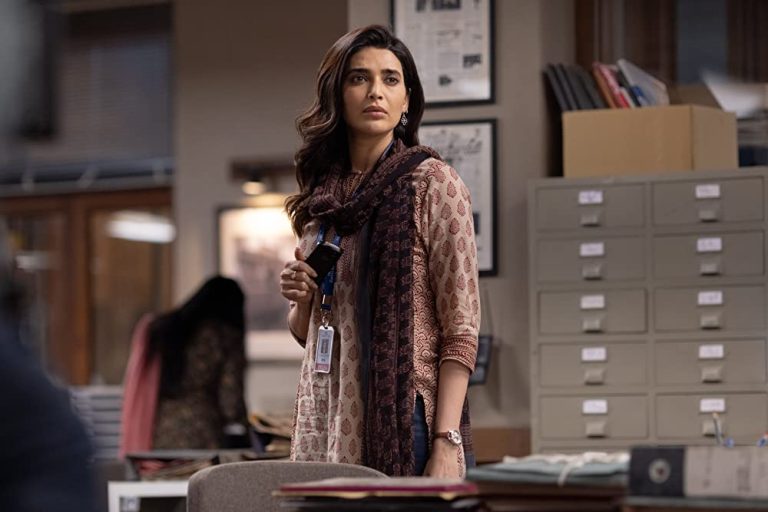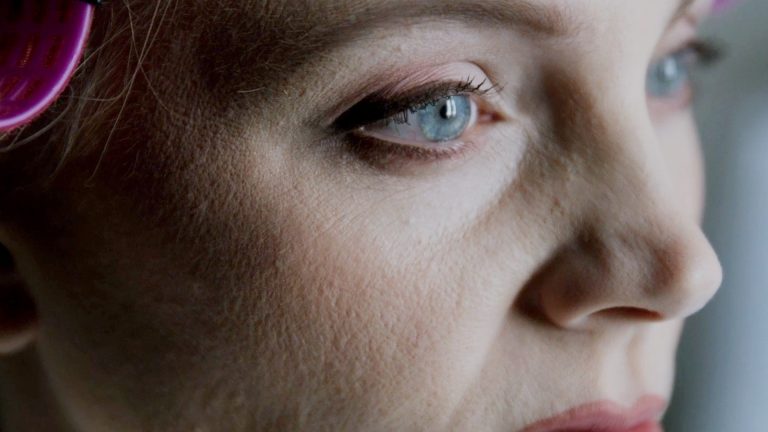Alcarràs (2022) ‘Mubi’ Review: Three tiny cousins play inside a turquoise car sitting at the edge of a peach orchard. They shoot finger pistols at imagined aliens in the distance, only to be interrupted by a tractor roaring out of the clear blue sky accompanied by a worker who’s come to take the rusted car away.
The opening scene of Carla Simón’s second feature sets up the stakes of its poignant story right from the get-go. The kids not only belong to a family on the brink of losing their farm, but soon, their entire way of living would be challenged by forces far more human. Winner of last year’s Golden Bear at Berlinale, Carla Simón’s follow-up to 2017’s “Summer 1993” feels even more textured and urgent.
“Alcarràs” follows the story of a three-generation Catalan family who one day is asked to change their entire way of living. At an early point, grandfather Rogelio (Josep Abad) gets an eviction notice as his adult son Quimet (Jordi Pujol Dolcet) fumes at his father for never getting the land rights agreement in proper writing. Turns out that years ago, the patriarch of the family had made a deal with the actual owners of the land, the Pinyols, that it now belonged to him.
There was only a verbal agreement — a promise that Pinyol’s son, who now is in charge of the property, has no legal obligation to honor. Now, Pinyol’s son wants to build a bunch of solar panels on the property — property which, as far as he is concerned, still belongs to his family. Through this inter-generational tale that finds its emotional cadence within its fluid structure, Simón echoes the frustrations of the West Catalonian countryside that stares at modernity encroaching upon itself.
Simón’s serendipitous approach of casting non-professionals brims to its full potential here, as we get to spend long stretches of the film observing the family trying to reclaim their own land in the most sustainable way. Soon, they create a homegrown inchoate family business. However, it’s one that, albeit empowering, never feels immune to the conflicting insecurity born out of the sense of displacement juddering underneath their own feet.
As we watch them do so, the film paints a struggle for survival against the looming threat of gentrification. Soon, the ineffable charm of the film morphs into something that feels way more timely, rendering our passive viewing of the family’s chores into a call for action.
Even during the more graceful scenes, where the pace may often seem lackadaisical, there’s a striking poignancy with which the camera frames Rogelio; his silent dignity lies within the acknowledgment of the fight his family is posing against. The tragedy remains in how while being the oldest person in the household, he’s seen politics shape the land dating back to the days of the Spanish Civil war.
Thus, he already anticipates the inevitable tragedy. Simón’s film works because even when it breezes off its more graceful parts by establishing a sense of place where love is so organically nurtured, the background and the foreground often overlap to evoke a sense of dread.
There’s a certain rhythm the screenplay of the movie lures you in with, which is precisely why when the political realities begin to impose, there’s a marked shift in the film’s tone. As I mentioned earlier, however, it’s all skillfully incorporated even when it’s all ticked off from the most basic of filmmaking rules. Conversations around the dinner table with everyone gradually shift from mundane to tense, even at the mention of the solar panels. Quimet starts talking to other farmers about potential protests while simultaneously working himself ragged along with everyone else.
While being caught up between the two, he realizes that his honor is never worth feeling guilty or embarrassed about as long as he can keep a hold on one thing that matters. One of the protests in the film’s final act marks a key point in the oldest patriarch’s emotional journey, where we get a wordless shot of Rogelio standing by himself under one of the (remaining) peach trees. It takes on an even greater meaning, especially coming out of last year’s farmers’ protests that the world saw across India.
Just like the way “Summer 1993” drove its melancholia out of the very essence of kids aimlessly playing among themselves, there’s an astonishing realism with which the director frames the characters here. After losing their car as the first casualty of the encroachment, the three kids lose their source of escapism.
They spend the entire film trying to find things in a keen attempt to transform those into their imaginations. That is until the film reaches its gut-wrenching ending, where a bulldozer tears apart through a landscape that had once defined their childhoods. Of course, Carla Simón frames this, too, in the background. But even the reminiscence of her past is plagued by a growing paranoia that the looming threat of rural displacement brings.


![Involuntary [2008]: About Rule Breaking, Actions and the Consequences](https://79468c92.delivery.rocketcdn.me/wp-content/uploads/2016/04/involuntary-2-768x458.jpg)



